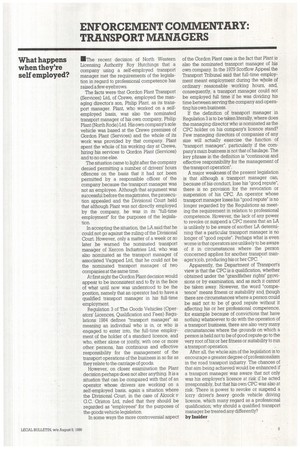What happens when they're self employed?
Page 51

If you've noticed an error in this article please click here to report it so we can fix it.
• The recent decision of North Western Licensing Authority Roy Hutchings that a company using a self-employed transport manager met the requirements of the legislation in regard to professional competence has raised a few eyebrows.
The facts were that Gordon Plant Transport (Services) Ltd, of Crewe, employed the managing directors son, Philip Plant, as its transport manager. Plant, who worked on a selfemployed basis, was also the nominated transport manager of his own company, Philip Plant (North Rode) Ltd. His own company's sole vehicle was based at the Crewe premises of Gordon Plant (Services) and the whole of its work was provided by that company. Plant spent the whole of his working day at Crewe, hiring his services to Gordon Plant (Services) and to no one else.
The situation came to light after the company denied permitting a number of drivers' hours offences on the basis that it had not been permitted by a responsible officer of the company because the transport manager was not an employee. Although that argument was successful before the magistrates, the prosecution appealed and the Divisional Court held that although Plant was not directly employed by the company, he was in its "full-time employment" for the purposes of the legislation.
In accepting the situation, the LA said that he could not go against the ruling of the Divisional Court. However, only a matter of a week or so later he warned the nominated transport manager of Xercon Industries Ltd, who was also nominated as the transport manager of associated Vagsped Ltd, that he could not be the nominated transport manager of two companies at the same time.
At first sight the Gordon Plant decision would appear to be inconsistent and to fly in the face of what until now was understood to be the position, namely that an operator had to have a qualified transport manager in his full-time employment.
Regulation 3 of The Goods Vehicles (Operators' Licences, Qualification and Fees) Regulations 1984 defines "transport manager" as meaning an individual who is in, or who is engaged to enter into, the full-time employment of the holder of a standard licence, and who, either alone or jointly, with one or more other persons, has continuous and effective responsibility for the management of the transport operations of the business in so far as they relate to the carriage of goods.
However, on closer examination the Plant decision perhaps does not alter anything. It is a situation that can be compared with that of an operator whose drivers are working on a self-employed basis, again a situation where the Divisional Court, in the case of Alcock v G.C. Griston Ltd, ruled that they should be regarded as "employees" for the purposes of the goods vehicle legislation.
In some ways the more controversial aspect of the Gordon Plant case is the fact that Plant is also the nominated transport manager of his own company. In the 1979 Scotflow Appeal the Transport Tribunal said that full-time employment meant employment during the whole of ordinary reasonable working hours, and, consequently, a transport manager could not be employed full time if he was dividing his time between serving the company and operating his own business.
If the definition of transport manager in Regulation 3 is to be taken literally, where does the managing director who is nominated as the CPC holder on his company's licence stand? Few managing directors of companies of any size will actually exercise the function of "transport manager", particularly if the company's main business is not that of haulage. The key phrase in the definition is "continuous and effective responsibility for the management of the transport operation".
A major weakness of the present legislation is that although a transport manager can, because of his conduct, lose his "good repute", there is no provision for the revocation or suspension of his CPC. An operator whose transport manager loses his "good repute" is no longer regarded by the Regulations as meeting the requirement in relation to professional competence. However, the lack of any power to revoke or suspend a CPC means that an LA is unlikely to be aware of another LA detemiining that a particular transport manager is no longer of "good repute". Perhaps what is even worse is that operators are unlikely to be aware of it in circumstances where the person concerned applies for another transport manager's job, producing his or her CPC.
Apparently, the Department of Transport's view is that the CPC is a qualification, whether obtained under the "grandfather rights" provisions or by examination, and as such it cannot be taken away. However, the word "competence" means fitness or suitability and though there are circumstances where a person could be said not to be of good repute without it affecting his or her professional competence, for example because of convictions that have nothing whatsoever to do with the operation of a transport business, there are also very many circumstances where the grounds on which a person is held not to be of good repute go to the very root of his or her fitness or suitability to run a transport operation.
After all, the whole aim of the legislation is to encourage a greater degree of professionalism in the road transport industry. The chances of that aim being achieved would be enhanced if a transport manager was aware that not only was his employer's licence at risk if he acted irresponsibly, but that his own CPC was also at risk. There is power to revoke or suspend a lorry driver's .heavy goods vehicle driving licence, which many regard as a professional qualification; why should a qualified transport manager be treated any differently?
by Insider




































































































